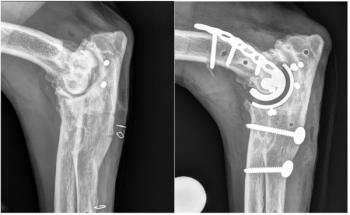
Just Ask the Expert: A protocol for treating IMHA
Dr. Christopher Byers gives his thoughts on treating this form of anemia.
Dr. Byers welcomes critical care questions from veterinarians and veterinary technicians.
We are treating a dog in which immune-mediated hemolytic anemia was diagnosed 10 days ago. Initial treatment included prednisone and doxycycline. After five days of this treatment, the dog required a packed red blood cell transfusion, and we initiated cyclosporine, azathioprine, and aspirin. Five days after that (10 days into treatment), the dog's hematocrit is still decreasing. Is there anything else we should be doing for the patient?
A. Immune-mediated hemolytic anemia (IMHA) is most commomly a primary disease, also called idiopathic IMHA. However, one common mistake practitioners can make is not being aggressive enough in identifying any underlying causes, such as neoplasia, that may make the IMHA a secondary disease. Make sure you have thoroughly investigated this possibility. This investigation should include an extensive history and thorough diagnostic testing.
Dr. Christopher G. Byers
IMHA is a complicated disease to treat. My typical initial treatment regimen for patients with confirmed IMHA in which no underlying primary disease is found (idiopathic IMHA) is similar to yours and includes
1. Immunosuppressive therapy—prednisone at 30 mg/m2 /day orally; concurrent cyclosporine at 5 mg/kg every 12 hours orally or intravenously (other immunosuppressive medications to be aware of include azathioprine, mycophenolate mofetil, and leflunomide)
2. Gastroprotection—famotidine at 0.5 mg/kg orally every 12 hours
3. Immunomodulation—melatonin at 3 to 6 mg every 12 hours
4. Antimicrobial therapy—doxycycline at 5 to 10 mg/kg orally every 12 hours for 28 days
5. Antiplatelet aggregation therapy (the most common cause of morbidity and mortality in patients with IMHA is thromboembolism1 )—aspirin at 0.5 to 1 mg/kg/day orally
Also, for patients that do not seem to be responding to therapy in the first week, keep in mind that prednisone may take up to seven days to become effective. Similarly, oral cyclosporine may take up to two weeks and azathioprine up to three weeks to exert their effects. Therefore, other therapies of temporary benefit, such as administering packed red blood cells, may need to be initiated and potentially repeated while waiting for patients to respond to these immunosuppressive treatments.
In some refractory cases, I also recommend intravenous immunoglobulin G (IVIg). There is limited and mixed research regarding the efficacy of this medication in patients with IMHA, but my anecdotal experience has been positive. The protocol I use is to infuse 0.5 g/kg intravenously over three to four hours for three consecutive days. Unfortunately, IVIg is a relatively expensive medication, and with limited proven efficacy, it may be hard to justify the expense.
There is an unfortunate lack of prospective research in our companion-animal species regarding the optimal immunosuppressive protocol, and each clinician seems to have his or her own preferences. The protocol detailed above has generally worked well for me, but as anyone who has been in practice for a while can attest, IMHA can truly be a frustrating disease to adequately control.
Christopher G. Byers, DVM, DACVECC, DACVIM
VCA Veterinary Referral Associates
500 Perry Parkway
Gaithersburg, MD 20877
REFERENCE
1. Weinkle TK, Center SA, Randolph JF, et al. Evaluation of prognostic factors, survival rates, and treatment protocols for immune-mediated hemolytic anemia in dogs: 151 cases (1993-2002). J Vet Med Assoc 2005;226(11):1869-1880.
Newsletter
From exam room tips to practice management insights, get trusted veterinary news delivered straight to your inbox—subscribe to dvm360.






